Subaru Forester vs Toyota Yaris Cross – Which model is better for everyday use?
Everyday use, family trips or long-distance drives – here’s where the differences show.
Discover whether Subaru Forester or Toyota Yaris Cross fits your lifestyle better.
Costs and Efficiency: When it comes to price and running costs, the biggest differences usually appear. This is often where you see which car fits your budget better in the long run.
Toyota Yaris Cross has a significantly advantage in terms of price – it starts at 23700 £, while the Subaru Forester costs 34700 £. That’s a price difference of around 11014 £.
Fuel consumption also shows a difference: Toyota Yaris Cross manages with 4.50 L and is therefore decisively more efficient than the Subaru Forester with 8.10 L. The difference is about 3.60 L per 100 km.
Engine and Performance: Power, torque and acceleration are the classic benchmarks for car enthusiasts – and here, some clear differences start to show.
When it comes to engine power, the Subaru Forester has a barely noticeable edge – offering 136 HP compared to 130 HP. That’s roughly 6 HP more horsepower.
In acceleration from 0 to 100 km/h, the Toyota Yaris Cross is slightly quicker – completing the sprint in 10.70 s, while the Subaru Forester takes 12.20 s. That’s about 1.50 s faster.
In terms of top speed, the Subaru Forester performs barely noticeable better – reaching 188 km/h, while the Toyota Yaris Cross tops out at 170 km/h. The difference is around 18 km/h.
Space and Everyday Use: Beyond pure performance, interior space and usability matter most in daily life. This is where you see which car is more practical and versatile.
Both vehicles offer seating for 5 people.
In curb weight, Toyota Yaris Cross is convincingly lighter – 1180 kg compared to 1693 kg. The difference is around 513 kg.
In terms of boot space, the Subaru Forester offers evident more room – 508 L compared to 397 L. That’s a difference of about 111 L.
In maximum load capacity, the Subaru Forester performs clearly perceptible better – up to 1731 L, which is about 634 L more than the Toyota Yaris Cross.
When it comes to payload, Toyota Yaris Cross barely noticeable takes the win – 510 kg compared to 492 kg. That’s a difference of about 18 kg.
Who wins the race?
The Toyota Yaris Cross proves to be is largely superior and therefore becomes our DriveDuel Champion!
Toyota Yaris Cross is the better all-rounder in this comparison.

Toyota Yaris Cross
Subaru Forester
The Subaru Forester is a versatile SUV known for its impressive off-road capabilities and practical design. With a spacious interior and advanced safety features, it offers comfort and security for both city driving and outdoor adventures. Its reliable performance and all-wheel-drive system make it a popular choice among those who appreciate a combination of functionality and rugged charm.
details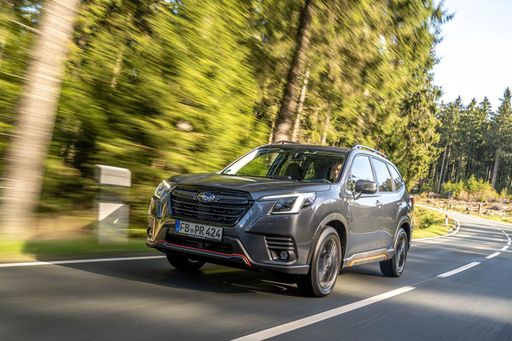 @ Subaru
@ Subaru
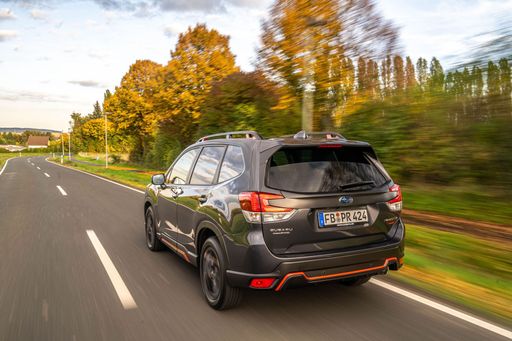 @ Subaru
@ Subaru
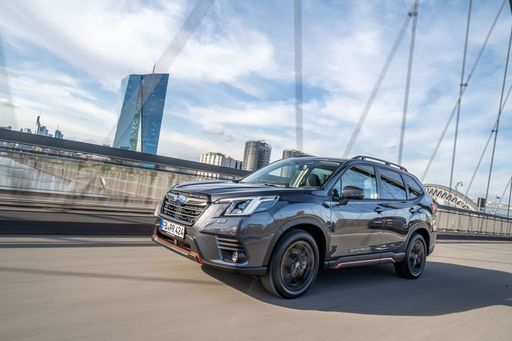 @ Subaru
@ Subaru
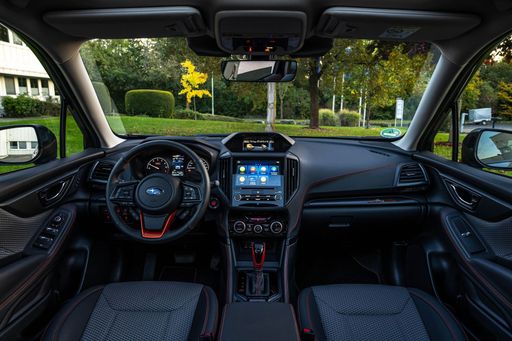 @ Subaru
@ Subaru
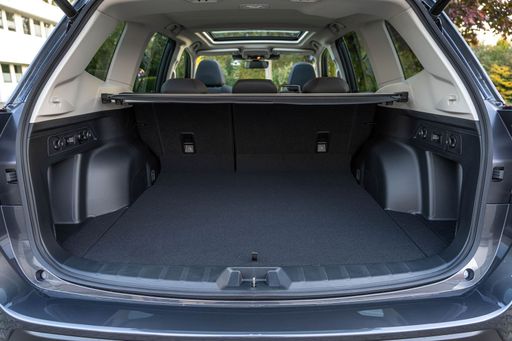 @ Subaru
@ Subaru
Toyota Yaris Cross
The Toyota Yaris Cross combines the practicality of a compact SUV with the agility of a smaller car, making it ideal for urban adventures. Its elevated seating position offers excellent visibility, while the stylish design ensures it stands out on the city streets. Inside, the Yaris Cross boasts a modern interior with advanced technology features designed to enhance the driving experience.
details @ Toyota
@ Toyota
 @ Toyota
@ Toyota
 @ Toyota
@ Toyota
 @ Toyota
@ Toyota
 @ Toyota
@ Toyota
 @ Toyota
@ Toyota
 @ Toyota
@ Toyota

|

|
|
|
|
Costs and Consumption |
|
|---|---|
|
Price
34700 - 42200 £
|
Price
23700 - 34300 £
|
|
Consumption L/100km
8.10 L
|
Consumption L/100km
4.5 - 4.8 L
|
|
Consumption kWh/100km
-
|
Consumption kWh/100km
-
|
|
Electric Range
-
|
Electric Range
-
|
|
Battery Capacity
-
|
Battery Capacity
-
|
|
co2
183 g/km
|
co2
101 - 108 g/km
|
|
Fuel tank capacity
48 L
|
Fuel tank capacity
36 L
|
Dimensions and Body |
|
|---|---|
|
Body Type
SUV
|
Body Type
SUV
|
|
Seats
5
|
Seats
5
|
|
Doors
5
|
Doors
5
|
|
Curb weight
1693 - 1739 kg
|
Curb weight
1180 - 1290 kg
|
|
Trunk capacity
508 L
|
Trunk capacity
320 - 397 L
|
|
Length
4670 mm
|
Length
4180 mm
|
|
Width
1830 mm
|
Width
1765 mm
|
|
Height
1730 mm
|
Height
1595 mm
|
|
Max trunk capacity
1679 - 1731 L
|
Max trunk capacity
1097 L
|
|
Payload
446 - 492 kg
|
Payload
485 - 510 kg
|
Engine and Performance |
|
|---|---|
|
Engine Type
Petrol MHEV
|
Engine Type
Full Hybrid
|
|
Transmission
Automatic
|
Transmission
Automatic
|
|
Transmission Detail
CVT
|
Transmission Detail
CVT
|
|
Drive Type
All-Wheel Drive
|
Drive Type
Front-Wheel Drive, All-Wheel Drive
|
|
Power HP
136 HP
|
Power HP
116 - 130 HP
|
|
Acceleration 0-100km/h
12.20 s
|
Acceleration 0-100km/h
10.7 - 11.3 s
|
|
Max Speed
188 km/h
|
Max Speed
170 km/h
|
|
Torque
182 Nm
|
Torque
-
|
|
Number of Cylinders
4
|
Number of Cylinders
3
|
|
Power kW
100 kW
|
Power kW
85 - 96 kW
|
|
Engine capacity
1995 cm3
|
Engine capacity
1490 cm3
|
General |
|
|---|---|
|
Model Year
2025
|
Model Year
2024 - 2025
|
|
CO2 Efficiency Class
G
|
CO2 Efficiency Class
C
|
|
Brand
Subaru
|
Brand
Toyota
|
What drivetrain options does the Subaru Forester have?
The Subaru Forester is available as All-Wheel Drive.
The prices and data displayed are estimates based on German list prices and may vary by country. This information is not legally binding.
